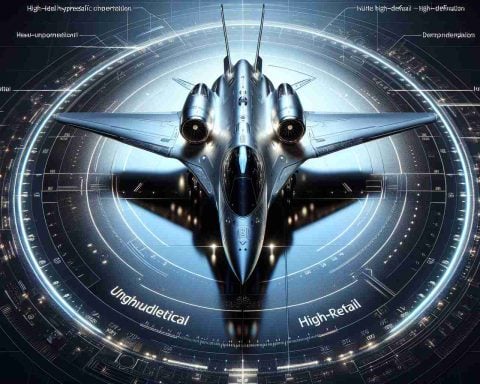In a significant display of military might, China deployed a remarkable 125 aircraft along with its Liaoning aircraft carrier and supportive naval forces for extensive drills in the waters surrounding Taiwan. These exercises, conducted recently, simulated strategic maneuvers aimed at blocking vital shipping routes and ports. Observers note that this display of military strength reflects the escalating tensions in the Taiwan Strait.
The Chinese Defense Ministry characterized these actions as a direct reaction to statements made by Taiwan’s president, who has firmly rejected Beijing’s insistence on Taiwan’s recognition as a part of China. This refusal highlights the ongoing tensions between the self-governing island and the mainland, fueling concerns about potential conflict in the region.
According to military analysts, such comprehensive exercises not only serve China’s strategic objectives but also act as a warning to Taiwan and its allies. As the situation develops, the international community is closely monitoring China’s military activities, which represent a growing challenge to the status quo in East Asia.
In summary, China’s recent military exercises around Taiwan reveal a proactive strategy to reinforce its claims over the island while simultaneously challenging its leadership’s position. The implications of these actions are profound, suggesting potential shifts in regional security dynamics.
The Impact of China’s Military Drills Around Taiwan
The recent military maneuvers conducted by China, involving 125 aircraft and the Liaoning aircraft carrier in the Taiwan Strait, have reverberated far beyond mere displays of military power. This escalation of tensions not only stirs fears of conflict but also significantly impacts the lives of individuals, the cohesion of communities, and the geopolitical climate of entire nations.
Escalating Local Tensions
For residents in Taiwan, the drills signal a dire message. The feeling of vulnerability has grown among citizens as they witness the might of the Chinese military displayed so close to their shores. This sense of unease has trickled down into everyday life, affecting daily routines, mental health, and public sentiment towards self-defense strategies. Many residents advocate for a stronger military presence and preparation for potential conflicts. In contrast, some citizens still cling to hopes for peaceful resolutions, creating divisions within communities on how to approach the relationship with China.
Internationally, Taiwan’s allies, particularly the United States, are closely monitoring the situation. They are compelled to reassess their military strategies and partnerships in the Asia-Pacific region. The potential for increased military presence in Taiwan leads to a complex balance of power that influences diplomatic relations and economic engagements across the globe.
Economic Implications
The impact of these military exercises also extends to economic concerns. The Taiwan Strait is a crucial shipping lane, essential for global trade, particularly in tech products and semiconductors. Any increased military tension could threaten trade routes, causing significant economic repercussions not just for Taiwan, but for countries that rely on those shipping channels. Businesses worldwide are already feeling the pressure, with fluctuations in markets as investors react to the news of drills and military posturing.
Controversies and Security Concerns
Amid these tensions, there are controversies regarding how much force is justified in securing territorial claims. Some argue that China’s military exercises are a legitimate assertion of sovereignty, while others claim they are aggressive posturing that disrupts regional peace. Critics in Taiwan emphasize that such drills are provocative and could easily spiral into conflict, stressing the need for international diplomatic interventions to de-escalate these tensions.
Furthermore, there are differing perspectives on Taiwan’s response. Some advocate for a strong military response, while others propose dialogue-oriented approaches. This discrepancy reflects larger ideological divides within Taiwan and poses broader questions about the future of cross-strait relations.
The Global Stakes
The actions of China in the Taiwan Strait extend beyond regional concerns and into the realm of international security. Many experts assert that a potential conflict over Taiwan could invoke responses from other global powers, leading to a broader military engagement reminiscent of Cold War tensions. As such, peace in the Taiwan Strait is crucial not only for the immediate parties involved but also for maintaining stability in the international community.
As the world keeps a watchful eye on Taiwan, the evolving dynamics present a troubling yet fascinating tapestry of interests, implications, and potential outcomes. The international community’s observations and interventions could play critical roles in shaping the future landscape of East Asia and beyond.
For more insights and perspectives on this evolving situation, visit Reuters or BBC.
The article has been updated: 2024-11-05 15:12
1. Reuters – A global news organization providing up-to-date information on international military actions and geopolitical developments.
2. BBC News – A reliable source for news around the world, including military conflicts and tensions in the Asia-Pacific region.
3. CNN – An international news channel that covers breaking news and analysis regarding military affairs and geopolitical issues.
4. Al Jazeera – A news outlet that focuses on global events, featuring in-depth reports and perspectives on military operations and regional stability.
5. The Wall Street Journal – A leading financial publication that provides insights into the economic implications of military activities and strategic tensions in areas like the Taiwan Strait.
6. The Guardian – Offers extensive coverage and commentary on international relations, including military conflicts and diplomatic efforts in the Taiwan Strait.
7. NBC News – A prominent news source reporting on global events, including military developments and political scenarios involving Taiwan and surrounding regions.
8. Forbes – Provides analysis on the economic impacts of military actions in the Taiwan Strait and overall assessments of geopolitical risk.
9. The Washington Post – Delivers comprehensive coverage of U.S. and global military strategies, with a focus on tensions in East Asia.
10. StrategyPage – Specializes in military analysis and strategic insights related to global military engagements, including the Taiwan Strait scenario.
The article has been updated: 2024-11-06 02:08
What are the implications of heightened military actions in the Taiwan Strait for regional security?
The recent increase in military activities in the Taiwan Strait raises significant concerns about regional security. These escalated actions can lead to heightened tensions between Taiwan and China, potentially increasing the risk of conflict. The presence of military forces may also prompt responses from other countries in the region, including the United States, which has interests in maintaining stability and supporting Taiwan. Additionally, this situation could disrupt shipping routes and economic activities in the area, affecting global trade. Overall, the heightened military actions serve as a reminder of the fragile geopolitical dynamics surrounding Taiwan and indicate the necessity for diplomatic efforts to mitigate risks of escalation.
















